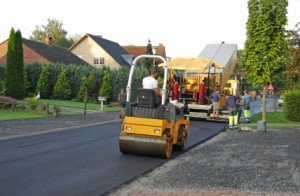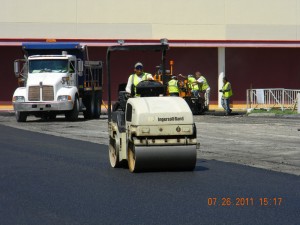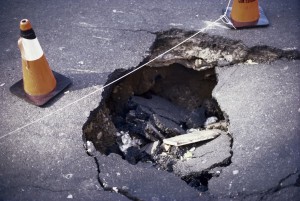While asphalt is known for its durability and strength, it still needs proper maintenance and can deteriorate over time. Properly laid asphalt can last a long time in your parking lot, but long-term exposure to the elements can cause damage faster than you may think. Continue reading to learn more about asphalt deterioration. (more…)
Blog
Archive for the ‘Asphalt Maintenance’ Category
What Causes Asphalt To Deteriorate?
Friday, August 31st, 2018Budgeting Needs for Asphalt Paving and Repairs With Property Managers
Friday, August 24th, 2018As property managers prepare their annual budget, it can be difficult to know how to much to budget for asphalt paving and maintenance. Asphalt paving and repair cost often vary from year to year, so it is not easy to know exactly how much money you need to budget for asphalt costs. Continue reading for a few tips on how to prepare for annual budgets, and how PTG can help evaluate your needed asphalt repairs. (more…)
Asphalt Index 101: What It Is And How It Affects You
Tuesday, June 5th, 2018Have you noticed that the price of asphalt changes frequently? This is because the cost of asphalt is dictated by the Asphalt Index, which changes every month. Maryland’s asphalt index is determined by The Maryland Asphalt Association, which updates its website every month with the new price. As of June 1, 2018, the Maryland asphalt index is $516.67. Continue reading to learn more about the asphalt index and how it affects you. (more…)
Differences Between Concrete And Asphalt
Wednesday, May 9th, 2018The Difference Between Asphalt And Tar
Monday, January 15th, 2018Tar and asphalt have a similar appearance and similar characteristics, but they are quite different materials. While they are both black, soften when heated, and harden when cooled, their performance properties are very different. Continue reading to learn more about the differences between asphalt and tar.
Asphalt
Asphalt is either in a solid or semi-solid consistency, depending on its temperature. It is a mixture made up of sands, grits, and stones (bitumens and aggregates.) Asphalt is produced in two different ways: natural asphalt and residual asphalt. As its name suggests, natural asphalt is obtained from nature, especially from lakes and rocks. Lake asphalt contains 40 to 70 percent of pure bitumen, which is then boiled to evaporate the water content separate impurities. Rock asphalt only contains 10 to 15 percent of pure bitumen and calcareous matter. The process includes crushing and heating the rocks, then suddenly cooling them to create consolidated rock. Residual asphalt is obtained in the residue of petroleum refining.
Tar
Tar is either in a solid or high viscous liquid consistency and contains a high amount of carbon content. Three general forms of tar include coal tar, wood tar, and mineral tar. Coat tar is obtained during the production of coal gas and is used for things including preserving timber and laying macadam roads. Wood tar is obtained by the distillation of resinous timber, such as pine wood. This type of tar has a preservative property, so is suitable for preserving wood. The exploitation of kerogens produces mineral tar.
Comparison Of Properties
While asphalt and tar look similar, tar often has a blacker color than asphalt, which is categorized as more of a black-brown color. Asphalt is either in a solid or semi-solid state, while tar is in a liquid state. Asphalt has a low carbon content and high water resistance, while tar is the exact opposite. Tar also has high adhesive power and a long setting time, and asphalt has a low adhesive power and shorter setting time.
Asphalt Maintenance You Can Trust from PTG Enterprises
If you want to protect your asphalt and ensure it has a long lifespan, choose PTG Enterprises for your sealcoating and asphalt maintenance needs. We offer commercial concrete, masonry, asphalt installation, repair, and paving throughout Baltimore, Harford, Anne Arundel, Howard, and P.G. Counties. If you are interested in hearing how we can help you, contact us online or give us a call at (410) 636-8777. For more tips and tricks, be sure to follow us on Facebook, Twitter, YouTube, LinkedIn, Google+, and Flickr.
Emergency Cold Tar Patching Through the Winter
Friday, December 22nd, 2017Winter has arrived in Maryland, bringing freezing temperatures, blustery winds, and icy precipitation, including sleet and snow. While it can be an exhilarating and invigorating time of year, the cold weather also presents special challenges for people who own businesses. One of those issues that you may not think of right away is damage to parking lots. This can be caused by changes in temperatures such as freezing and thawing. If you notice cracks or potholes in the parking lot of your business, you need to make repairs right away before the problem gets worse.
The Environment Effects of Road Salt and Eco-Friendly Alternatives
Friday, December 8th, 2017Road salt is used throughout the country by municipalities and property management companies to keep roadways and parking lots safe. However, road salt is not always the best thing for the asphalt or pavement that it’s being placed on. Beyond how it affects the pavement itself, it’s also important to consider the environmental ramifications of road salt. (more…)
Why Does Asphalt Deteriorate?
Wednesday, November 8th, 2017
While asphalt is one of the most durable materials used in construction, it can also deteriorate over time from errors and improper maintenance.
As one of the most durable materials used in construction, asphalt adds dependability and strength to all paving and building projects. Aside from those factors, the result is also a sleek, professional look that will make people marvel. However, like any other material, over time asphalt will start to show signs of its age and exposure. Even asphalt that is well maintained will begin to deteriorate after some time, depending on its environment and how it’s used. Here are some reasons why asphalt deteriorates. (more…)
The Many Benefits of Sealcoating
Friday, August 25th, 2017Sealcoating a thin liquid layer added over a paved surface serves to protect it from damage caused by UV rays, rain and snow, and fluids from vehicles. Sealcoating won’t cure existing issues, like cracks, but it will help prevent such damage from forming in the first place. Aside from keeping out damaging elements, properly applying a sealcoat is important to extend the life of asphalt paving. Sealcoating protects and prolongs the life expectancy of asphalt pavement by filling surface damage and providing a protective layer to keep out damaging UV rays, vehicle fluids and water. (more…)
What Is Asphalt Seal Coating?
Friday, August 4th, 2017Seal coating is a true barrier between asphalt surfaces and the destructive elements. The term “seal coating” means keeping the redeeming properties of asphalt sealed in to prolong the pavement life and preserve its functional properties. The primary reason to sealcoat an asphalt pavement is to protect the pavement from the deteriorating effects of sun and water. When asphalt pavement is exposed to sun, wind and water, the asphalt hardens, or oxidizes. This causes the pavement to become more brittle. As a result, the pavement will crack because it is unable to bend and flex when exposed to traffic and temperature changes. (more…)

























